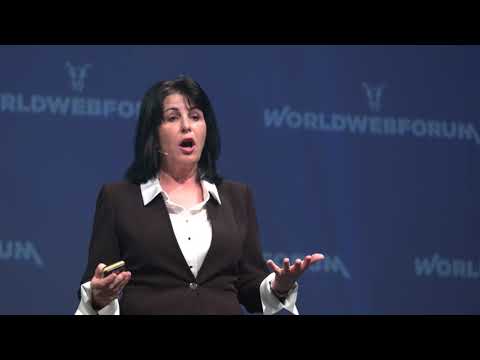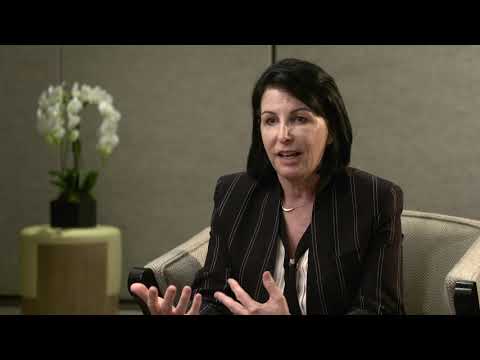Videos
Learn More About Kelly Palmer
As technology has transformed the economy over the past decade, the types of skills required of employees have changed drastically and continue to do so. Where do business leaders turn when they realize their employees don’t have the skills required to help their company succeed into the future? Kelly Palmer, an esteemed thought leader on learning, business and career development, challenges leaders to let go of outdated models for upskilling and re-skilling the workforce. By developing strategies that address the reality of automation, digitization and acceleration in this new world of work, Palmer helps organizations tap into the expertise of their current workforce and make learning a true competitive advantage.
The gap between what skills companies need and the skills employees have is real. Palmer’s insights and framework help organizations address this chasm through personalized, lifelong learning and greater reliance on technology and data. Equipped with a record of success as an executive at several Silicon Valley tech companies including LinkedIn, Yahoo! and Sun Microsystems, Palmer is currently Chief Strategy Officer at Southern New Hampshire University (SNHU) and was formerly on the executive team of Degreed, an education technology company that gives employers the tools they need to identify and measure employees’ skills. With her Degreed partner and fellow thought leader David Blake, Palmer created the Skills Quotient, a practical, non-proprietary framework that every company can use to measure the skills required against the skills needed, for individuals, teams and the entire company. It elevates the practice of talent and skills measurement from the middle of the organization to the C-Suite, giving every CEO a way to answer for the skills of their organization and a way to track progress with accountability. Palmer and Blake outlined their revolutionary approach in their groundbreaking book “The Expertise Economy: How the Smartest Companies Use Learning to Engage, Compete, and Succeed” (Nicholas Brealey, September 2018).
Palmer is a seasoned Silicon Valley leader. She was the Chief Learning Officer at LinkedIn, vice president of learning at Yahoo! and held executive positions in learning, M&A, and product development at Sun Microsystems. She speaks regularly at companies and business conferences around the world, and has been featured in the Harvard Business Review, Financial Times, Fast Company, Forbes, Entrepreneur, Inc., Chief Learning Officer (CLO), and on Bloomberg radio. Kelly has a bachelor of Arts in English/communications and a Master of Science in adult learning and education technology.
Kelly Palmer is available to advise your organization via virtual and in-person consulting meetings, interactive workshops and customized keynotes through the exclusive representation of Stern Speakers & Advisors, a division of Stern Strategy Group®.
The Expertise Economy: The Future of Work and Skills
The workplace is going through a large-scale transition with digitization, automation, and acceleration. Critical skills and expertise are imperative for companies and their employees to succeed in the future, and the most forward-thinking companies are being proactive in adapting to the shift in the workforce. Kelly Palmer, Silicon Valley thought leader, reveals the trends that are causing disruption in the workplace and how they are changing and shaping the way we need to think about upskilling and reskilling the workforce. Digital transformation is a major component of most company strategies and focusing on employee learning and skills can be a major competitive advantage. Palmer describes how she and other business leaders have created forward-thinking learning and career transformation strategies that help drive a company’s success.
The Skills Quotient
There isn’t a CEO in the world today who can answer for the skills of their organization. Just as Net Promoter Score (NPS) gave a common framework for customer satisfaction, leaders have long needed that type of solution for skills. That is what Skills Quotient (SQ) does; it introduces a common non-proprietary framework that every company can use to compare the job skills required to the skills possessed by individuals and teams across the entire company. It elevates the practice of talent and skills measurement from the middle of the organization to the C-Suite, giving every CEO a way to confirm the skills within their organization.
An Arduous Year And A Half At Work Punctuates Soft Skills
September 29, 2021
Skill Data: the Secret to Your 2021 L&D Strategy
February 17, 2021

The Expertise Economy: How the Smartest Companies Use Learning to Engage, Compete, and Succeed
(Nicholas Brealey, September 2018)
“Disruption in any industry is a process, not a one-time event. With so much change on the horizon, Kelly and David highlight the imperative firms have to harness learning to stay in the game.”
“Everyone agrees that learning provides a competitive edge in an outsourced, automated economy. But what’s the essential next step? In The Expertise Economy, Kelly Palmer and David Blake make a persuasive case that companies play a huge role in shaping the future of learning. This excellent book offers practical and evidence-based insights that can help CEOs and other business leaders challenge the status quo.”
“The opportunity to scale new learning curves at work is an intrinsic career value for an ever-increasing slice of the workforce, and an imperative for organizations who want to stay in the game, much less ahead of it. The Expertise Economy offers a framework for leaders to future-proof the skills of their people and organizations.”
“Brilliant, timely and significant, this book blows the lid off the learning theories of the past!”
“The Expertise Economy makes clear the importance of skills in the corporate world. For most companies, understanding what skills your employees have, what skills they need, and their agility in learning new skills, will bring a competitive edge in the future.”
“Timely, clever, and useful insights on how learning enables individuals and organizations to flourish in a rapidly changing world. Anyone or any company seeking to learn how to learn will savor these insights and master these principles.”
“The Expertise Economy is must-read for anyone who cares about the future of their workforce and organization.”
“Learning has always been one of the secret weapons of the world’s highest performing companies. Kelly and David’s book unlocks this secret and is filled with advice on how to make learning a competitive advantage for any company.”
“The Expertise Economy shows how companies can use learning and skills as key differentiators to stay ahead of the competition and ultimately help close the widening skills gap.”
“The Expertise Economy is a unicorn among business books. It presents a human and business reason to address the skills gap in a holistic way with suggestions for how universities, companies and individuals can work together to prepare for the future workplace.”



































